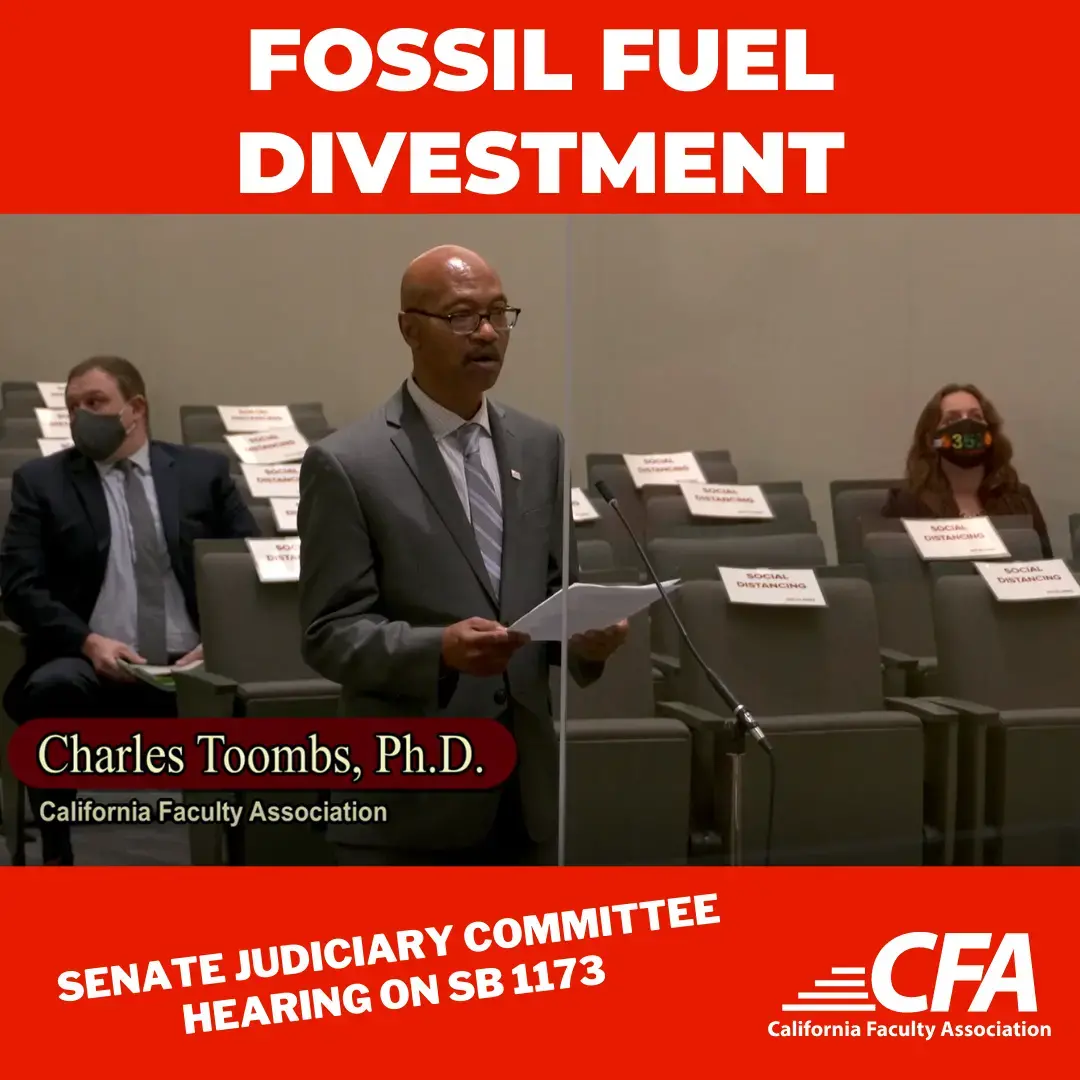CFA Priority Bills Protect Parents, Faculty, Students; Push CalPERS to Divest From Fossil Fuels
This week, CFA hosted its annual Lobby Week. CFA members and students met with their Assembly and State Senate representatives to discuss CFA’s sponsored and co-sponsored bills and budget requests.
On Tuesday, we received great news: two of our priority bills passed out of their respected committees. Senate Bill 1173, our CalPERS and CalSTRS divestment from fossil fuels bill, passed out of the Senate Judiciary Committee.
“A major contradiction in our work on climate change is that our public pension systems, combined, have approximately $8.9 billion currently invested in fossil fuel companies,” Charles Toombs, CFA President, said during his testimony on Tuesday in support of SB 1173.

Assembly Bill 2464, our parental support for faculty bill, passed out of the Assembly Higher Education Committee.
“Some people might be asking, why do we need this bill? Why not work to expand parental leave through collective bargaining instead? However, it’s important to recognize that adequate paid parental leave should not just be a perk or benefit that comes from a benevolent employer. This is a public policy issue. This is an equal rights issue. And this is an issue of fairness, equity, and inclusion,” said Meghan O’Donnell, CFA Associate Vice President, Lecturers, North, during her testimony on Tuesday in support of AB 2464.
Here are CFA’s sponsored and co-sponsored bills:
Sponsored Priority Bills
Alternative Policing
Assembly Bill 1997, a bill from Assemblymember Mike Gipson,would require the Chancellor of the California State University, on or before July 1, 2023, to convene a workgroup to find alternatives to police. The bill specifically spells out that the workgroup must include faculty, staff, and students.
AB 1977 would require the workgroup, at a minimum, to evaluate and report on alternative options to current emergency response programs on the campuses of the California State University and alternative dispute resolution options to resolve employee conflicts.
Teacher Credentialing Task Force/Elimination of TPAs
Assembly Bill 2047 from Assemblywomen Cristina Garcia would require the Commission on Teacher Credentialing to convene a Teacher Credentialing Task Force by March 2023, with educators from each segment of the higher education system, students in teacher credentialing programs, organizations representing university faculty, teachers, and administrators to examine the current teacher credentialing process and the impact that high-stakes teacher credentialing assessments, including the California Subject Examination for Teachers (CSET), California Basic Educational Skills Test (CBEST), Reading Instruction Competence Assessment (RICA) and Teacher Performance Assessments (TPAs), and their associated costs have on the current teacher shortage and the lack of diversity in the teaching workforce.
The bill would also require the Commission to provide a report on the findings and recommendations from this Task Force to the Legislature by December 2023 that outlines the barriers these assessments present, and policy recommendations based on those findings, for increasing the number and diversity of qualified educators in California.
AB 2047 would also end the use of Teacher Performance Assessments (TPA) in California’s teacher-education programs. This includes removing TPAs from all high-stakes decisions. This bill would protect prospective teachers from the expenses related to TPAs and prevent additional financial and emotional burdens on our prospective teachers.
Parental Support
Assembly Bill 2464, also from Assemblywomen Cristina Garcia, would require bargaining unit employees to be entitled to one semester of paid parental leave. Such leave shall be taken consecutively, unless mutually agreed otherwise by the employee and the appropriate administrator.
This leave would be charged only for workdays and may be used the birth of a child or the placement of a child with an employee in connection with the adoption or foster care.
Divest from Fossil Fools
Senate Bill 1173, which was introduced by Assemblymember Ash Kalra, would prohibit the boards of the Public Employees’ Retirement System and the State Teachers’ Retirement system from making new investments or renewing existing investments of public employee retirement funds in a fossil fuel company.
The bill would require the boards to liquidate investments in fossil fuel companies on or before July 1, 2027. The bill would require yearly report beginning on February 1, 2024, that would be filed with the legislature and Governor including a list of fossil fuel companies of which the board has liquidated their investment.
Co-Sponsored
California Law Enforcement Accountability Reform Act
Assembly Bill 655 is a two-year bill authored by Assemblymember Ash Kalra, requiring the background investigation for peace officer candidates to include an inquiry into whether a candidate for specified peace officer positions has engaged in membership in a hate group, participation in hate group activities, or public expressions of hate, as those terms are defined. Certain findings would disqualify a person from employment.
Independent Coroners’ Offices
Assembly Bill 1608, another bill from Assemblymember Mike Gipson, would ensure that local death investigations are conducted independently and objectively, reducing any perception of biased investigative medical examinations when determining the cause of death of an individual, including those in custody.
Student and Faculty Housing Act: Environmental Impact Reports
Senate Bill 886, authored by Senator Scott Wiener would streamline decisions through the California Environmental Quality Act (CEQA) that are made by the UC, CSU, and community colleges to build or expand student housing by excluding these developments from the definition of “projects” under CEQA.
The exemption does not apply to sites located within very high wildfire risk areas, farmland, hazardous waste sites, earthquake zones, flood zones, wetlands, habitats for protected species, or a conservation area.
This would only apply to student or faculty/staff housing projects on campus-owned land.
The student or faculty/staff housing projects may include auxiliary uses, such as dining facilities and study spaces.
SB 886 would require the colleges and universities to use skilled and trained contractors and pay them a prevailing wage.
Join California Faculty Association
Join thousands of instructional faculty, librarians, counselors, and coaches to protect academic freedom, faculty rights, safe workplaces, higher education, student learning, and fight for racial and social justice.